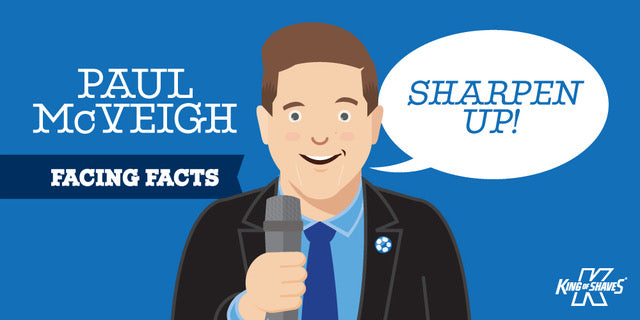
For our second 'Facing Facts' interview, Jonathan S. Bean spoke to Paul McVeigh - a global keynote speaker and former Premier League footballer. We talk about rebelling against the typical footballer stereotype, the performance mindset of professional sportspeople, and the importance of personal presentation.
A ruthless profession
I have been a global keynote speaker for ten years. I travel around the world, speaking to businesses and sharing my insights, lessons and experience from the world of professional football, which I consider is potentially the most ruthless and most competitive industry on the planet.
Growing up, pretty much every kid I knew, playing on my street, wanted to be a professional footballer. Only I made it.
This wasn’t just the case for my street in Belfast, growing up in the 80's and 90's, but probably every other street, in every other city, in every country around the world. So many people want to do it, yet only a tiny percentage of our planet’s population ever get a chance to play in the Premier League. That’s why I call it the most competitive profession on the planet.
When I’m speaking to businesses, I clarify and quantify just how difficult that is. I talk about what it takes to achieve something very, very few people on the planet can do, and what can be learnt from this.
I approach it from a mental performance or psychological perspective. There are different elements of performance - such as technical, physical, tactical - but in my opinion, the main reason I had a twenty year professional career was due to the mental side of my game.
I was applying strategies and techniques to my game that were probably ahead of their time twenty-five years ago: Visualisation, yoga, personal development, goal-setting, and having a coach and mentor from outside of the world of football. I tried to bring all of these together to be the best I could ultimately be.
Not just another footballer
The typical footballer stereotype is there for a reason. I was always slightly rebelling against that and didn’t want to be just another footballer as our reputation wasn’t exactly complimentary.
I first arrived in England in the early 90's and joined Tottenham Hotspur. I’d listen to the first team players say things like “Make sure you play as long as you can. Your playing days are the best days of your life. You’re a long time retired.”
If I believed what they were saying - “Your football years are the best of your life” - the inference was that as soon as you retire (and most people do well to get to 30) the rest of your life was pretty much downhill. This is a horrible thing to think when you’re a young man in your 30s.
Early on, I made the decision as to whether I should just accept what other people said to me, or make my own mind up and do what I wanted to do. I realised if I adopted those beliefs of what other footballers say and do, then I would end up becoming just another footballer.
Don’t believe everything you hear - and don’t believe everything you think, either - because what you’re capable of in life is not predetermined. If you want to, you can decide your path.
Going down the route of becoming a Keynote Speaker was a completely different path that has never been trod before by any other footballers.
Elite thinking
The motivation and intention of a Keynote Speaker is completely different to an after-dinner speaker, for example, who is there to entertain. The message might be about achieving elite performance, how to better yourself, and how to start achieving the things in your life you’ve only ever dreamed of.
You may come away from an after-dinner speech feeling entertained, but you might come away from a Keynote Speech with a different life. That is really, really powerful.
There are many aspects of my job that I love: Delivering a speech in a lovely hotel in London, New York or Singapore; talking to an audience that are generally already high achievers; and sharing lessons from my life and careers. But potentially having the ability to change someone’s life for the better is hugely fulfilling, and being able to help people is what makes it so rewarding.
The audience might ask “How has this person on stage - who has put themselves in the category of the 0.001% of the population to have achieved what a lot of people want to do - been able to do that?”
When you look at the people that society considers to be the most successful on the planet, they clearly have a different strategy to the majority. If you want to improve your life, have better things in your life, be better, do better or have anything different, then in my opinion the first thing you need to change is your thinking and psychology.
I think the difference between professional sportspeople and the rest of the population is that they have either hardwired themselves, or were already hardwired, to want to improve. They want to get to the top and be the best at what they do.
The ability to keep going, keep improving, and keep climbing up the ladder is something that’s built into you from an early age. It’s why professional sport is so competitive.
So many people want to do it and generally, when you get a lot of alpha males or females in a group, they all want to be the best, but of course, not everybody can. Then it’s about who has the dedication and application to be the best.
Always competing
Success depends on how you’re able to handle being a professional sportsperson.
Playing the sport is the easy part. The hard part is everything else associated with being an athlete: Being criticised and having people come up to you in the street to tell you you’re shit because you had a bad game at the weekend; or worrying about someone starting on you during a night out because they don’t agree with how you’re playing at the moment.
If you have the single-mindedness to try to be the best you can be, and deal with all the distractions or things going wrong - and still have the wherewithal to get back on your feet to achieve what you’ve decided is worthwhile for you - then you’re going to become successful.
As a kid, I wanted to become a professional footballer, and, fortunately, I became one. As the opportunities kept arriving across my path, I kept taking them, knowing at some point someone could say “You’re not good enough to get to the next level”. For me, that happened after I became a professional footballer, when I was released by Spurs when I was 21 after six years at the club.
I could have taken that as the end of my career. Instead, I decided to double down, put in more work, more effort, and become even more committed, because my goal of becoming a professional footballer was so important to me.
When I had joined Spurs, I didn’t help them get in the Premier League because they were already there and doing well. Returning to the Premier League in 2004 with Norwich City, therefore, felt like a lifetime’s achievement.
With Norwich, we were in the Championship for three years after I joined before we won the league and got promoted. That felt even more enjoyable because I knew 100% that I was a part of the reason for us getting into the Premier League.
The best player I played against was Thierry Henry at Arsenal. He had everything you could ever want or need as a professional footballer: The physique of a racehorse, six foot three, as lean as a butcher’s dog, and able to run like the wind. He could score goals at will - probably in his sleep - and was a good looking Frenchman that everybody loved. What else could you need?
At that time, Arsenal had just finished the entire season unbeaten and were known as the “Invincibles”. We didn’t have a chance. It was like men against boys. How do you compete with someone that’s exceptional and you’re nowhere near that level? When you’re playing against someone who’s so world class, you know you’re going to lose, but we still turned up and put the effort in, because we all had that dedication and competitiveness.

Personal branding
As a Keynote Speaker, there's an expectation that if I went in looking half-shaven, with stubble, or not well-dressed, people wouldn't take me seriously.
Perception and what people think of me is important, and I consider how I come across on my LinkedIn profile, through my website, social media, when having text or email conversations, phone calls, or whatever. It all creates a certain impression that you will have of me before you even pick up the phone to speak to me.
In every photograph that I have, or whenever I'm on stage, I'm always clean shaven, because that makes me feel like I'm turning up ready to perform.
When I was playing football, I’d always have my kit, my football boots and shin pads. That's what I needed to perform to my potential.
Now, whenever I'm going on stage, I need to look professional, world class, exceptional even, so that the people in the audience, as soon as I walk into the room, say “Wow, that’s the professional footballer”.
It’s personal branding, and branding is absolutely paramount.
Thank you for talking to us, Paul!
If you would like to find out more about Paul, or perhaps book him to speak, you can find his website here, he's on twitter here, YouTube here and on Linked In here.
